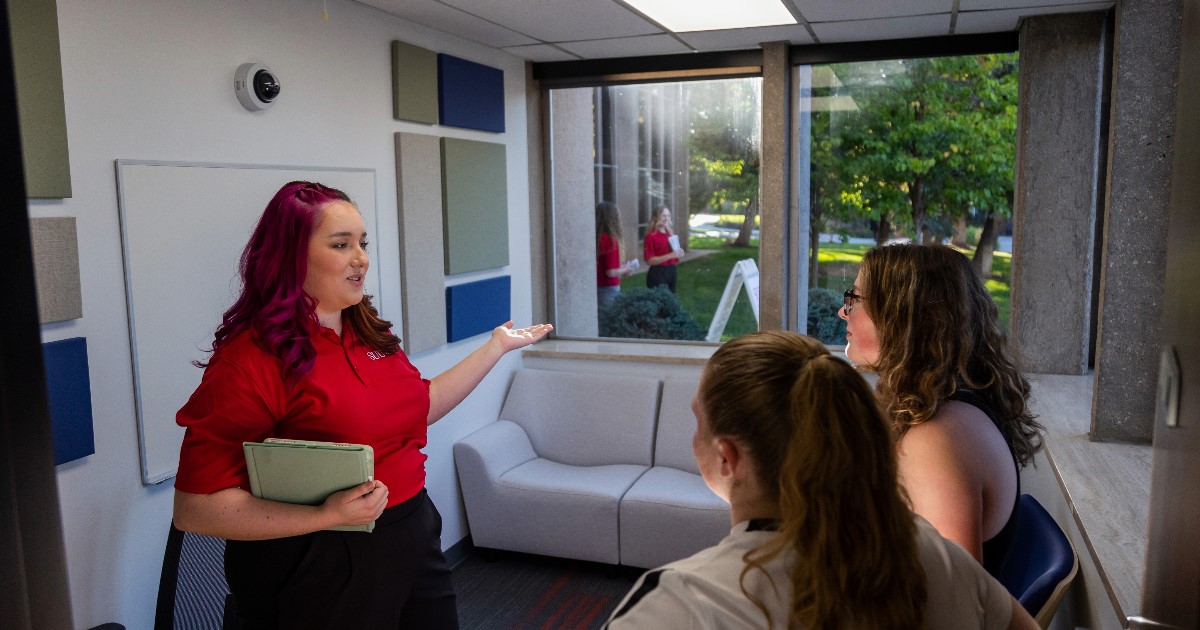SUU Community Counseling and Assessment Clinic Grand Opening
Published: October 20, 2023 | Author: Abbie Cochrane | Read Time: 5 minutes

Southern Utah University officially opened a psychology training clinic on September 26, 2023. With the recent launch of the doctorate of clinical psychology program, the purpose of the clinic is to provide doctoral students with training where they will see clients and work to improve their ethical therapeutic practices. Boasting extremely qualified students and faculty, the training clinic is sure to take psychology at SUU to the next level. The clinic opening was celebrated with an open house where attendees toured the new facilities and saw how and where doctoral students would be working with clients. The clinic is located on the first floor of the Bennion Building.
Dr. Kat Green works as a clinical faculty member in the Psychology Department and Training Clinic Director for the SUU Community Counseling and Assessment Clinic, and has helped oversee the clinic’s progress from concept to completion.
“The training clinic is a functioning community clinic where PsyD students will be the therapists, closely supervised by licensed faculty members,” said Green. “The training clinic clients will be members of the Cedar City community. It is a fundamental part of most clinical psychology programs, even more so in a rural area where there are limited external training sites available. It's some of the more rigorous training students will get, as all sessions will be video-recorded to review clinician service delivery, student-therapists meet weekly for group and individual supervision, and students engage in significant time learning and training in evidence-based interventions and assessments.”
The PsyD program accepts 10 students each year and currently has its first two cohorts of students enrolled, with applications open for the next cohort that will join next fall. Students are expected to spend four years training in residency and a fifth year at an APA-accredited internship site off-campus/out-of-state. They will work and train in the program training clinic in years 2, 3 and 4, of their program receiving top-notch training through the guidance of highly experienced and qualified faculty.
Some faculty, like Dr. Michael Steele, came to SUU specifically to be a part of the PsyD program.
“Since the presentation of the idea of a clinic, our initial efforts have been focused on developing the program literally from scratch,” said Steele. “Not only the layout of the clinic itself but creating the curriculum, implementing program policies, finding clinical training sites, designing courses, etc,” said Steele. “It is a staple clinical training site, where students will see patients for three of the four years of their training. Since our first cohort arrived in the fall of last year, our next steps have been to continue to develop elements of the program.”
The clinic is equipped with state-of-the-art materials and resources that student clinicians will use and have access to. In particular, the audiovisual system allows students to review their sessions, identify specific areas and receive feedback related to their individual training goals. In addition, the clinic provides access to a range of the most up-to-date training resources within its library and some of our phenomenal undergraduate student workers have developed excellent processes to support the graduate student endeavors in using resources in effective and innovative ways. Clinicians will treat clients within one of four sub-clinics: Worry and Mood (anxiety and depression), Specific Phobias and OCD, Childhood Disruptive Behavior, and a Psychological Assessment Clinic
Sarah Flood is a student clinician at the PsyD clinic and offered her comments about how the community can utilize this new mental health resource.
“Even though CAPS is the primary intended care for students, as CAPS’ focus is more on development and life transitions, if a student’s situation aligns more with the clinic, the student could potentially be seen as a patient. Patients can start as young as three years, and other patients of varying ages and situations are also able to be seen and receive the best care for them.”
“Because of the generous support from the State of Utah as well as the ongoing support from so many members of the university campus,” Green added. “The facilities here offer an extraordinary level of supervision and training. It will also provide a great, low-cost resource for many individuals and families in Cedar and surrounding areas, allowing students to connect and give back to their community.”
Even though the PsyD program at SUU is new, it’s already applying for accreditation through the American Psychological Association. Since obtaining a clinical residency or internship is part of the final step of students’ training, their ability to secure said position is dependent upon the program’s accreditation and licensure status.
“Because there is a dearth of mental health services in the Southern Utah Region, the clinic will provide a critical resource for the surrounding communities,” Steele continued. “Consequently, the work our students do in the clinic will be vital to their clinical training, their competitiveness for internship/residency, and ultimately will impact their ability to become licensed.”
The SUU PsyD program offers its thanks to the support of the university community in their efforts to open the clinic. Additionally, special thanks is extended to the President’s office for helping move the PsyD program forward, the leadership of the Provost and the HSS Dean’s office for their respective and crucial roles, as well as support from individuals in IT, finance and accounting, facilities, the SUU Police Department and everyone who helped get the clinic to where it is today.
To learn more about applying for the PsyD program, as well as what courses are offered through the clinic, visit their website.
